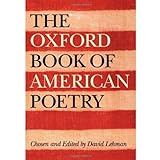
Average Reviews:

(More customer reviews)The one thing a reader may reasonably ask of such a collection is that it make a serious effort to be balanced. Greatness and coverage have to fight it out, with a vision of the whole book acting as referee. This does not really happen here. For example, the editor is something of an expert on A.R.Ammons, and a dozen or so of his poems are included. James Dickey? Nothing. Nary a jingle. This raises uncomfortable questions, as Dickey was clearly one of the finest American poets of the second half of the twentieth century (read Cherrylog Road, or The Heaven of Animals, or any of another 30-40 of his best poems). By all accounts, Dickey was a difficult, even boorish, person who alienated most of the literary establishment with his objectionable personal qualities and his "manly man" old-boy non-literary accomplishments (football player, fighter pilot). Who cares? Leaving him out of a 1080-page collection of American poetry could be seen as an act of editorial dishonesty. While (as far as I can tell) no other omission matches this one, the large amount of space devoted to some poets of the first rank, as another reviewer noted, does tend to freeze out a number of first-rate poems by poets of the second or third rank.
In Dickey's case it looks like literary politics; in other cases it is a matter of taking some good poets (like Ammons) or great poets (like Whitman) and overplaying them so others are underrepresented or absent.
If an anthologist were guided by a question such as "What would I say to a reader of 200 years hence if that reader knew how to read English but would never know any other American poetry?" then a fair balance between greatness and coverage might be approximated. As it stands, this is another seriously flawed anthology. Perhaps the only thing the national tradition can do is to assemble an anthology of anthologies and hope that, as usual, the wisdom of all will surpass the tastes of one. This is not guaranteed, however, in the short to medium term, at least. Until T.S.Eliot and a few adventurous editors helped to resuscitate people like the Jacobean poets and dramatists, they were known mainly to astute scholars and alert readers who searched them out in the musty corners of famous university libraries. Nearly 300 years after the fact, literary readers were still stuck in Thomas Moore, Cowper, and other now mostly forgotten worthies, in addition to the usual suspects (the big names), and had barely heard of Tourneur, Webster, or even Donne.
Editing a big-name anthology like the Oxford, and following in the steps of two illustrious predecessors, brings with it the responsibility to fulfill a serious educational trust. Everything included means something is excluded, and the difference between having one poem in the book and none is a thousand times bigger than the difference between one and two. It would be interesting to do an anthology of 1000 American poets, with each poet getting a single entry.
So, dear reader, if you already have a few anthologies of American poetry, go ahead and add this one. Like other "doorstops," it will serve as a decent collection of links to individual poets. If you have none, buy three or four and consider including this duckling.
Click Here to see more reviews about: The Oxford Book of American Poetry
Click here for more information about The Oxford Book of American Poetry

0 comments:
Post a Comment